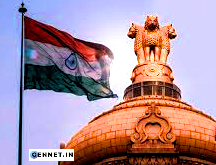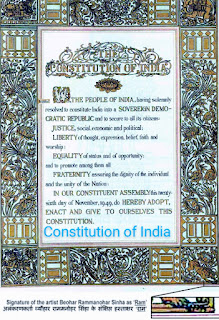All Information Constitution of India 2023
The preamble of the Indian Constitution serves as a brief introductory statement of the Constitution that sets out the guiding purpose, principles and philosophy of the Indian Constitution. The objectives stated by the Preamble are to secure justice, liberty, equality to all citizens and promote fraternity to maintain the unity and integrity of the nation.
On 26, January 1950, replacing the Government of India Act (1935) as the governing document of India, the Constitution of India came into effect.
Preamble of Indian Constitution
1. WE, THE PEOPLE OF INDIA, having solemnly resolved to constitute India into a SOVEREIGN SOCIALIST SECULAR DEMOCRATIC REPUBLIC and to secure to all its citizens:
2. JUSTICE, social, economic and political; LIBERTY of thought, expression, belief, faith and worship;
3. EQUALITY of status and of opportunity.
4. and to promote among them all FRATERNITY assuring the dignity of the individual and the unity and integrity of the Nation.
5. IN OUR CONSTITUENT ASSEMBLY this twenty-sixth day of November, 1949, do HEREBY ADOPT, ENACT AND GIVE TO OURSELVES THIS CONSTITUTION
Important Preamble of Indian Constitution
Sovereign
The term ‘Sovereign’ means that India has its own independent authority and it is not a dominion of any other external power. In the country, the legislature has the power to make laws that are subjected to certain limitations.
Socialist
The term ‘Socialist’ means the achievement of socialist ends through democratic means.
Secular
The term ‘Secular’ means that all the religions in India get equal respect, protection and support from the state.
Democratic
The term ‘Democratic’ means Constitution of India has an established form of Constitution which gets its authority from the will of the people expressed in an election.
Republic
The term ‘Republic’ indicates that the head of the state is elected by the people directly or indirectly. In India, the President is the head of the state and he is elected indirectly by the people.
24 January important in history of India
Republic Day 2022: January 24 is of equal importance to India as Republic Day for many reasons, check the reasons below.
India celebrates Republic Day on January 26 every year and this year the country will mark its 73rd Republic day celebrations. On a special day in the year 1950, India adopted its Constitution and it came into effect abolishing the Government of India Act 1935 as governing document of India.
India got its independence in the year 1947 but it was later in 1950, on Jan 26, India got its own constitution and governing document. The constitution has declared the Republic of India as sovereign, socialist, secular and democratic republic” and assured that people of the country get “justice, equality and liberty, and endeavours to promote fraternity”.
Each year, the celebrations of Republic Day start from January 24. However, from this year onwards, it will start from Jan 23 to mark Shubhas Chandra Bose’s anniversary. But why every year until now, January 24 was celebrated in India?
January 24 is of equal importance to India as Republic Day as on this day in 1950, India adopted its ‘Jana Gana Mana’ as its National Anthem. Interestingly, ‘Vande Mataram’ was also adopted as India’s national song on this day in 1950.
-On the very same day, the assembly elected Rajendra Prasad as the nation’s first President. India after independence got its first constitutional head as a president on January 24, 1950.
-Also, The new Constitution of India, declaring the Dominion of India a Republic, was approved and signed by the 284 members of India’s Constituent Assembly.
National Anthem ‘Jana Gana Mana
Originally composed as Bharoto Bhagyo Bidhata in Bengali by polymath Rabindranath Tagore, Jana Gana Mana formal rendition is of approximately 52 seconds. It was first publicly sung on 27 December 1911 at the Calcutta now Kolkata Session of the Indian National Congress
Title: Jana Gana Mana
Music by: Rabindranath Tagore
Lyrics by: Rabindranath Tagore
Raga: Alhiya Bilawal
Written on: December 11, 1911
First sung on: December 27, 1911
Declared as National Anthem on: January 24, 1950
Time to play: 52 seconds
About Ambedkar Sir
Bhimrao ramji ambedkar in india’s hindu society. And who later renounced Hinduism and inspired the Dalit, Buddhist movement. Ambedkar served as chIrman of the drafting committee of the constitution of India.
Full Name : Bhimrao Ramji Ambedkar
Born : 14 April 1891, Dr. Ambedkar Nager India
Education : London School of Economic and political science
Spouse” s name : Savita Ambedkar
Died : 6 December 1956 , Delhi , INDIA
I hope you guys like this article please share and comment



